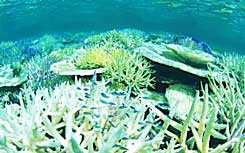Corals / The rise in water temperature in the oceans damages the algae that live inside the coral and provide it with food
Rinat Zafir, Haaretz (News and Walla!) and the news agencies

Corals in the Indian Ocean that have undergone bleaching. They are also affected by forest fires
Direct link to this page:
https://www.hayadan.org.il/coralswhite.html
The Great Barrier Reef on the east coast of Australia is one of the most important in the world, thanks to its size and the diversity of its fauna, and the Australian government has invested a lot of effort in its preservation for many years. Last year it was discovered that in most parts of the reef the corals underwent a process of bleaching, which means death. Apparently, this is a side effect of human-caused global warming.
The bleaching observed in Australia is further evidence of the global threat of extinction facing coral reefs. Last week, the journal Science published studies, from which it appears that within decades a complete extinction of the reefs may occur in the world. However, according to one study there will only be a partial extinction, and particularly hardy coral types will survive.
The coral researchers examined different regions of the world and were helped by archeological records and anthropological studies. Their conclusion: the destruction of the corals began already thousands of years ago, when humans began looking for food in the reefs, which are an ecosystem rich in marine creatures. It is not only about the direct destruction of the corals, but also the destruction of the flora and fauna with which they maintain interdependent relationships.
It turned out that the Indian tribes - considered to be those who know how to take advantage of nature without causing it devastating damage - were also among those who started destroying the ecosystem. In the Caribbean, for example, Indian tribes exterminated the population of the green turtle, which lives in the reef environment. In most places in the world, the process of destruction and exploitation took place in a similar way: it started with the hunting of large predators such as sharks, and moved on to the hunting of animals such as turtles; After that the marine vegetation disappeared, and eventually the corals themselves were damaged.
By 1900, 80% of the reefs in the world had already been damaged due to their exploitation by man for thousands of years. The processes of destruction accelerated after the last 100 years the pollution from waste water and industrial activity increased greatly, divers began to work inside the reefs, and their economic exploitation - including fishing - expanded. In places like Jamaica, the coral reefs have already become a poor remnant of what they once were. Most of the reefs have few corals left and most of the fish species have disappeared. But even reefs like the "Great Briar" are, according to the scientists, one third of the way to extinction.
One of the main reasons for the death of corals in recent years is, apparently, an increase in the temperature of the ocean water associated with global warming. The warming damages the algae that live inside the coral and provide it with food. As a result, the food supply to the coral's tissues stops and they become increasingly white - until the coral's death.
The corals are also damaged by forest fires, most of which are man-made. Researchers examining the large fires that occurred in Indonesia in 1997 concluded that the smoke from the fires provided large amounts of iron to the sea. The same iron helped the development of algae populations that suffocated the corals in the area.
However, according to another study now published in "Science" there are coral species that have shown greater resistance to changes in sea temperatures. The scientists agree that the uniqueness and importance of a coral reef lies in its rich variety of species, and the survival of a few resistant species is not enough.
In the opinion of coral researchers, conservation efforts for coral reefs must be significantly expanded to give them a chance to survive in the future as well. These efforts should include, among other things, severe restrictions on fishing, expanding the area of nature reserves that include reefs, and preventing pollution of various kinds.
Report: People and coral don't mix (CNN)
Environmentalist - Earth
For previous information on the subject
The fishermen use cyanide - and destroy the coral reefs in Southeast Asia"
https://www.hayadan.org.il/BuildaGate4/general2/data_card.php?Cat=~~~608472225~~~61&SiteName=hayadan

One response
What do the destruction of coral reefs, the damage to the ozone and the corona virus have in common?
Those who think that bats are the source of the corona virus should think again.
There is no negative natural phenomenon in our world that does not originate from man.
The point is only how sophisticated are those glasses in which we have the ability to explore reality.
While the destruction of coral reefs is done both physically and as a result of the damage to the ozone caused by human actions, the corona phenomenon is the result of more hidden connections at the level of intentions and thoughts between humans, the most developed level of nature